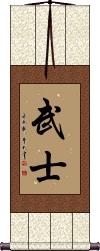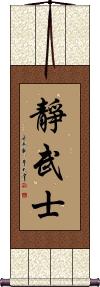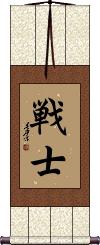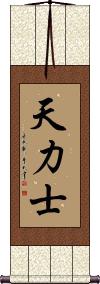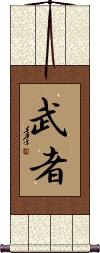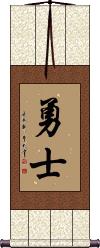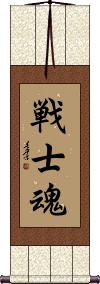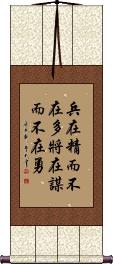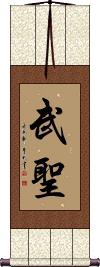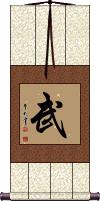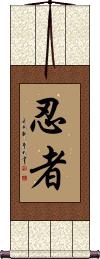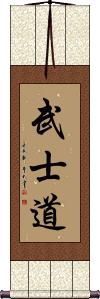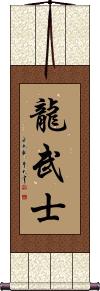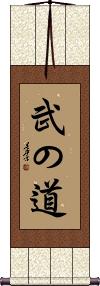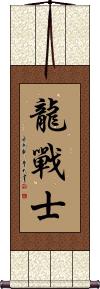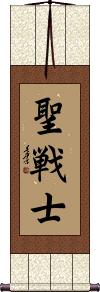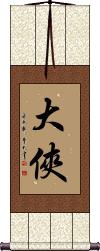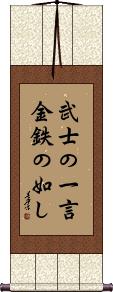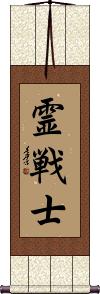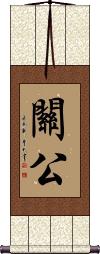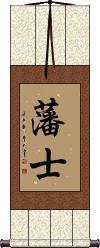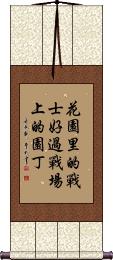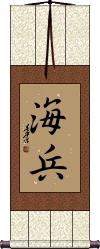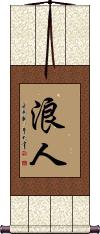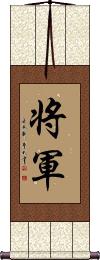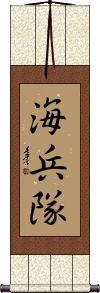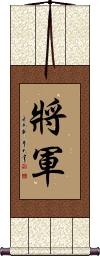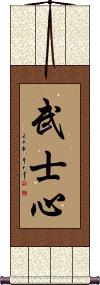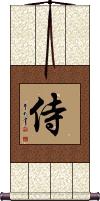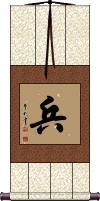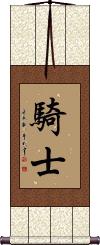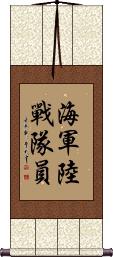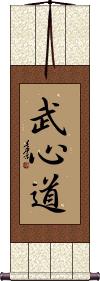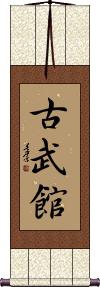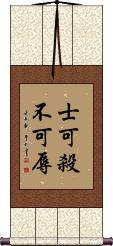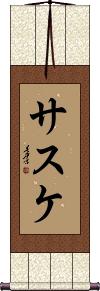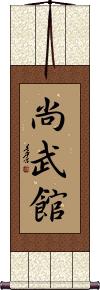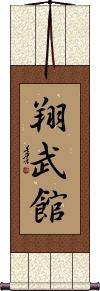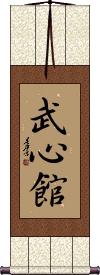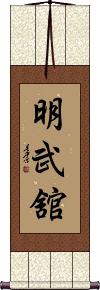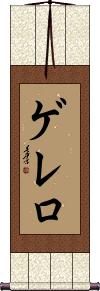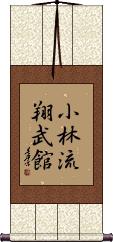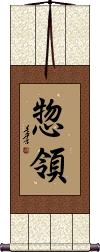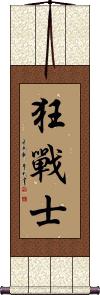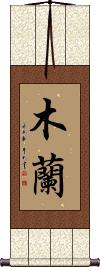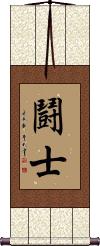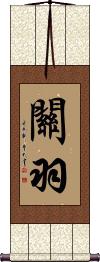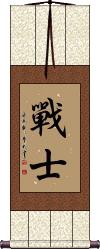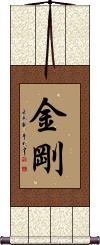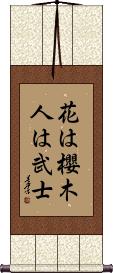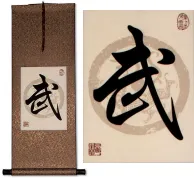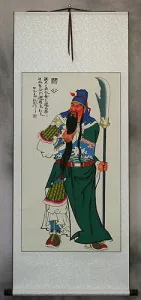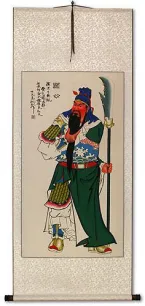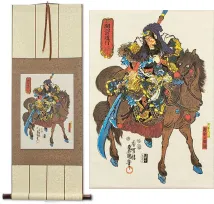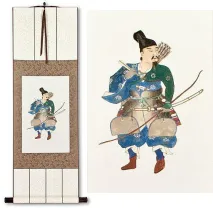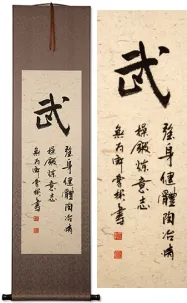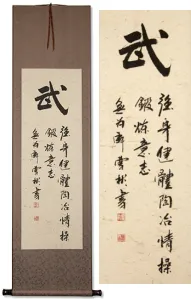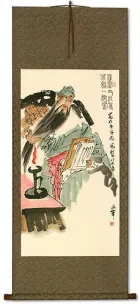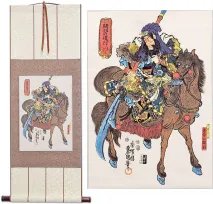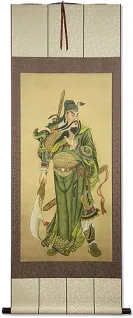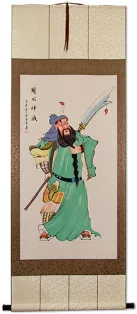Many custom options...
And formats...

Warrior in Chinese / Japanese...
Buy a Warrior calligraphy wall scroll here!
Personalize your custom “Warrior” project by clicking the button next to your favorite “Warrior” title below...
See also: Bushido - Code of the Samurai Warrior
1. Warrior
2. Daredevil Warrior / Soul of a Warrior
6. Warrior Soul / Heroic Spirit
10. Brave Warrior
11. Warrior Soul / Spirit of a Fighter
12. Warrior of the Heavenly Realm
14. Warrior Saint / Saint of War
15. Warrior Essence / Warrior Spirit / Martial
16. Ninja
17. Warrior Within
18. Bushido / The Way of the Samurai
19. United States Marine Corps
20. Dragon Warrior
21. Silent Warrior
22. Peaceful Warrior
23. Warrior’s Path
24. Dragon Warrior
25. Silent Warrior
26. Inner Warrior
28. Warrior’s Heart
29. Warrior Scholar
30. Quiet Warrior
31. Holy Warrior
32. Inner Warrior
34. Noble Warrior
35. Shadow Warrior
36. Wind Warrior
38. Dragon Warrior
39. Ghost Warrior
40. The Warrior’s Word, Dependable as Gold and Steel
43. Warrior Monk / Soldier Priest
44. It is better to be a warrior in a garden than a gardener in a war
45. Marine / Soldier of the Sea
46. Ronin / Masterless Samurai
48. Marine Corps
49. Chinese or Korean Army General
50. Marine Corps
51. Warrior of God / Soldier of God
52. Heart of a Warrior / Samurai Heart
53. Samurai
54. Soldiers
55. Knight
57. Marine
58. Bushindo
59. Kobukan
62. Sasuke
63. Shobukan
64. Bushinkan
65. Hua Mulan
66. Paladin
67. Advance Bravely / Indomitable Spirit
68. Meibukan
69. Guerrero
71. First Born
72. Avenger
73. Berserker
75. Magnolia
77. Guan Yu
78. Fighter
79. Diamond
Warrior
The first character, 武, is the spirit or essence of a warrior. The second character, 士, means soldier, officer, or official. 武士 is also used appropriately enough to describe a piece of a chess game. 武士 can also be translated as a soldier, cavalier, palace guard, or samurai, and sometimes as a knight. I've occasionally seen this translated as strong man or tough man (gender not necessarily implied).
By far, 武士 is the most common way to write warrior in Chinese characters, Japanese Kanji, and old Korean Hanja.
Note: In Japanese, this is Bushi, as in Bushido.
Daredevil Warrior / Soul of a Warrior
鬼武者 is an unusual title that can be translated two ways, daredevil warrior or demon warrior.
The most common is probably the daredevil warrior. However, the first character means demon, ghost, or soul of the departed. Therefore, it can mean the soul of a warrior or a demon warrior.
This title is Japanese only, and should not be used if your audience is Chinese.
Quiet Warrior
靜武士 is the shortest way to write “Quiet Warrior” or “Tranquil Warrior” in Chinese.
See Also: Peaceful Warrior
Quiet Warrior
靜謐武士 means “Quiet Warrior” in Chinese.
靜謐 means quiet or tranquil.
武士 means warrior or soldier.
See Also: Peaceful Warrior
Warrior for Peace
和平武士 means “Warrior for Peace” (a warrior who fights for peace) in Chinese.
Note this is not the same thing as a “peaceful warrior.”
See Also: Peace
Soul of a Warrior
精神勇士 can be translated as the spirit or soul of a warrior. The first two characters can be translated as vigor, vitality, drive, spirit, mind, heart, mental essence, and psychological component. Basically, “your soul.”
The second two characters mean “warrior” or literally “brave soldier/man,” although some will translate this word as “hero.” Therefore, this is also how to say “soul of a hero.”
Note: This title is best for Chinese and old Korean. It does make sense in Japanese but is not a common or natural Kanji combination in Japanese.
We have two versions of this phrase. The only difference is the first two and last two characters are swapped. The version here suggests that you are the warrior or hero. The other version suggests that you admire or like the idea of the spirit of a warrior.
Warrior Soul / Heroic Spirit
勇士精神 can be translated as the warrior's spirit or warrior's soul. The first two characters can be translated as “warrior” or literally “brave soldier/man,” although some will translate this word as “hero.” Therefore, this is also how to say “heroic spirit.”
The second two characters mean vigor, vitality, drive, spirit, mind, heart, mental essence, and psychological component. Basically “your soul.”
We have two versions of this phrase. The only difference is the first two and last two characters are swapped. The version here suggests that you admire or like the idea of the spirit of a warrior. The other version suggests that you are the warrior or hero.
Warrior / Fighter
Senshi
Warrior of Heaven
天力士 means “Heavenly Warrior,” or “Hero of Heaven,” in Chinese, old Korean, and Japanese.
Often used in a Buddhist context.
Warrior / Musha
Brave Warrior
勇士 is the Chinese, Japanese Kanji, and old Korean Hanja for a brave warrior, a brave person, a hero, or a brave man.
In Japanese, this can be a given name, Yuuji.
Warrior Soul / Spirit of a Fighter
Warrior of the Heavenly Realm
天界力士 means “warrior of the heavenly realm” in Chinese, old Korean Hanja, and Japanese Kanji.
This is also known as Narayana in Buddhism.
Value of Warrior Generals
兵在精而不在多將在謀而不在勇 is a proverb that informs how it is better to have warriors of quality, rather than just a large quantity of warriors in your army/force.
This literally means: [Just as] warriors [are valued for their] quality and not [just] for quantity, [so] generals [are valued] for their tactics, not [just] for [their] bravery.
See Also: 兵在精而不在多
Warrior Saint / Saint of War
Warrior Essence / Warrior Spirit / Martial
武 is the essence or spirit of a warrior. 武 is part of the word “wu shu” which is sometimes translated as “martial arts” or “kung fu.”
In more modern speech and another context, this can mean military, martial, warlike, fierce, and perhaps violent but usually as a prefix for a longer word or phrase.
Ninja
In feudal Japan, ninjas or shinobi (literally, “one who is concealed” or “one that endures”) were sometimes assassins and agents of espionage. The ninja, like samurai, followed their special code of conduct.
The role of the ninja has been romanticized in many American movies (and to a lesser extent in Japanese movies). Because the ninja craze has taken off in the west, Japan has followed the trend, and you'll see plenty of ninja-related imagery in Japan.![]() Note that when writing this as Kanji, Japanese tend to write the first character in the form shown to the right. If you select a Japanese calligrapher, please expect that form. Our Chinese calligraphers can also write it in Japanese form, but only if you request it (in the special instructions about your order during checkout).
Note that when writing this as Kanji, Japanese tend to write the first character in the form shown to the right. If you select a Japanese calligrapher, please expect that form. Our Chinese calligraphers can also write it in Japanese form, but only if you request it (in the special instructions about your order during checkout).
Warrior Within
Bushido / The Way of the Samurai
武士道 is the title for “The Code of the Samurai.”
Sometimes called “The Seven Virtues of the Samurai,” “The Bushido Code,” or “The Samurai Code of Chivalry.”
This would be read in Chinese characters, Japanese Kanji, and old Korean Hanja as “The Way of the Warrior,” “The Warrior's Way,” or “The Warrior's Code.”
It's a set of virtues that the Samurai of Japan and ancient warriors of China and Korea had to live and die by. However, while known throughout Asia, this title is mostly used in Japan and thought of as being of Japanese origin.
The seven commonly-accepted tenets or virtues of Bushido are Rectitude 義, Courage 勇, Benevolence 仁, Respect 礼(禮), Honour 名誉, Honesty 誠, and Loyalty 忠実. These tenets were part of oral history for generations, thus, you will see variations in the list of Bushido tenets depending on who you talk to.
See our page with just Code of the Samurai / Bushido here
United States Marine Corps
米海兵隊 is the Japanese way to write “United States Marine Corps” or simply “U.S. Marines.”
Breaking down each Kanji, this means:
“rice (American) ocean/sea soldiers/army/military corps/regiment/group.”
This title will only make sense in Japanese, it is not the same in Chinese! Make sure you know your audience before ordering a custom wall scroll.
If you are wondering about rice, America is known as “rice country” or “rice kingdom” when literally translated. The Kanji for rice is often used as an abbreviation in front of words (like a sub-adjective) to make something “American.” Americans say “rice burner” for a Japanese car and “rice rocket” for a Japanese motorcycle. If you did the same in Japanese, it would have the opposite meaning.
Note: I have not verified this but I’ve found this title used for U.S. Marines in Korean articles, so it’s most likely a normal Korean term as well (but only in Korean Hanja).
See Also: Marine Corps | Navy | Army | Art of War | Warrior | Military
Dragon Warrior
Silent Warrior
Peaceful Warrior
平和の武士 can be read as “Peaceful Warrior” or “Warrior for Peace” in Japanese. This sounds like an oxymoron in Japanese, so it's a weird title. Expect Japanese people to be perplexed when they see it.
Character breakdown:
平和 (heiwa) peace; harmony.
の (no) possessive particle.
武士 (bushi) warrior; samurai; soldier.
Peaceful Warrior
平和的武士 means “Peaceful Warrior” in Chinese. This does in fact sound like an oxymoron in Chinese - but many of you have asked for this special title.
Note this is not the same thing as “warrior for peace.”
See Also: Peace
Warrior’s Path
Dragon Warrior
Silent Warrior
Inner Warrior
Enlightened Warrior
覺醒武士 is not a commonly used title in Chinese but is sometimes used in Martial arts and military contexts to refer to a warrior who seems always to be fully aware, enlightened, knowledgeable, noble, and just.
The first two characters are a word that means: to awaken; to come to realize; awakened to the truth; the truth dawns upon one; scales fall from the eyes; to become aware.
The last two characters mean warrior but can also refer to a samurai, soldier, or fighter.
Warrior’s Heart
Warrior Scholar
Quiet Warrior
Holy Warrior
Inner Warrior
The Warrior Within
Noble Warrior
Shadow Warrior
影武者 is the title for Shadow Warrior in Chinese and Japanese.
This may refer to a few video games that share this English title, or a Japanese movie called Kagemusha.
If you are looking for the Japanese TV show, that was originally 影の軍団 (Kage no Gundan), which more literally means “Army of Shadows,” but was re-titled Shadow Warrior when released outside Japan in English.
In Japan, this title can also refer to a body double or decoy of an army general or leader used to avoid assassination. It can also be somebody who does all the work (or fighting) behind the scenes (not getting much, if any, credit).

Wind Warrior
Heart of a Warrior
Dragon Warrior
Ghost Warrior
The Warrior’s Word, Dependable as Gold and Steel
武士の一言金鉄の如し is an old Japanese proverb about the value of the word of a warrior.
Here are a couple of versions of how this can be translated:
A warrior's single word is as unchanging and reliable as gold and steel.
A warrior's promise is as dependable as gold, and his [scabbard contains] untarnished steel (a sword).
Note: Sometimes this phrase is written as 男子の一言、金鉄の如し (danshi no ichigon kintetsu no gotoshi)
Note: Because this selection contains some special Japanese Hiragana characters, it should be written by a Japanese calligrapher.
Spiritual Warrior
Guan Gong / Warrior Saint
關公 is a Chinese title, Guan Gong, that means Lord Guan (The warrior saint of ancient China).
 While his real name was Guan Yu / 關羽, he is commonly known by the title of Guan Gong (關公).
While his real name was Guan Yu / 關羽, he is commonly known by the title of Guan Gong (關公).
Some Chinese soldiers still pray to Guan Gong for protection. They would especially do this before going into battle. Statues of Guan Gong are seen throughout China.
Warrior Monk / Soldier Priest
It is better to be a warrior in a garden than a gardener in a war
花園里的戰士好過戰場上的園丁 is the Chinese for the phrase, “It is better to be a warrior in a garden than a gardener in a war.”
This proverb is purported to come from the following exchange:
A student approaches his samurai master and says,
“Teacher, you instruct me how to fight, yet you preach to me about peace. How do I reconcile the two?”
The samurai responds,
“Because it is better to be a warrior in a garden than a gardener in a war.”
Marine / Soldier of the Sea
海兵 is a way to express “Marine” as in an individual “Soldier of the Sea” in Japanese Kanji and old Korean Hanja characters (not to be confused with Korean Hangul).
Breaking down each character, this means:
“ocean/sea soldier/army/warrior.”
Please note that this Japanese/Korean version kind of means “sailor” or “navy” in Chinese.
See Also: Military
Ronin / Masterless Samurai
The 浪人 or Ronin have no master - The most famous are the 47 ronin created after their Lord committed suicide. This term was not a positive title for the Samurai of ancient Japan. However, in recent years, movies and video games have glorified the term Ronin.
In Chinese, this term has the original meaning of a hobo, vagabond, or ruffian.
In Korean Hanja, these characters would be read as adventurer, wanderer, someone without a steady job, or someone who is wasting away time.
In modern Japan, this term is used as a nickname for a high school student who has failed a college entry exam (and is trying again).
In Chinese and Korean, the Japanese definition of “Masterless Samurai” is known because of the historical context. Even in Japanese, the literal translation is closer to the Chinese and Korean definitions shown above.
This will make a fine wall scroll if you are a fan of the Ronin or see yourself as a Ronin of sorts. However, please think twice before getting a Ronin tattoo!
Shogun / Japanese General
将軍 or Shogun, in the simplest definition, is a General, but you could also use words such as commander, lord, overlord, highest ranking, or commanding officer.
The title “Shogun” has held some slightly ambiguous meanings at times in Japanese history.
In the west, when someone mentions “Shogun,” we may be filled with thoughts of gallant warriors. Some might even think of the TV mini-series with Richard Chamberlain. Often westerners use the words, Samurai and Shogun interchangeably, but that's really not technically correct. In the case of the Samurai, the Shogun was a designated (by the emperor) leader of a gild of Samurai. In this context, the Shogun was a Samurai lord. Or effectively, a commanding officer of a company of Samurai - to put it in modern military terms.
Sometimes a Shogun was a general; other times, he was the leader of a military government in Japan - but not a front-line warrior like a Samurai.
Variants of the same characters are used in China for the rank and title of a General of the People's Liberation Army (and the same term and characters have been used for the last 2200 years since the Qin Dynasty).
Marine Corps
海兵隊 is the Japanese and Korean way to express “Marine Corps” or simply “Marines.” It is not specific, so this can be the Marine Corps of any country, such as the British Royal Marines to the U.S. Marines.
Breaking down each character, this means:
“ocean/sea soldiers/army corps/regiment/group.”
See Also: Military
Chinese or Korean Army General
將軍 is the more Chinese and Korean Hanja version or General.
There is a slight variation in the way the first character is written compared to the Japanese Shogun (将軍) title.
So if you want to specifically refer to a Chinese or Korean General, this is the way. Japanese people would still easily identify this as “shogun.”
Note: This term is also used for Admiral in Korean in a certain context (if you need a better title for Admiral, just let me know).
Marine Corps
海軍陸戰隊 is the Chinese way to express “Marine Corps.” This could be the Marine Corps of virtually any country that has an amphibious military force.
Let me know if you want a more specific title, such as British Royal Marines or U.S. Marine Corps.
The Chinese title for Marines is very verbose...
Breaking down each character this means:
“ocean/sea military/arms shore/land fighting/war/battle corps/team/group.”
See Also: Military
Warrior of God / Soldier of God
Heart of a Warrior / Samurai Heart
Samurai
In Japanese, 侍 represents the warriors that attempted to hold peace when there was no Emperor in Japan.
Be cautious though, as it is an old way to express “servant” or “waiter” in Chinese and Korean. Of course, if you are a samurai, you are a servant to your Shogun-ate, Lord, or the people (which is the root meaning).
See Also: Warrior
Soldiers
兵 can be used to express soldiers, troops, a force, an army, weapons, arms, military, warfare, tactics, strategy, or warlike.
The final meaning depends on context. It's also part of the Chinese title for the Terracotta soldiers. In fact, this character is usually used in compound words (words of more than one character). Sometimes this single character is the title used for the pawns in a chess game (in a related issue, this is also a nickname for soldiers with the rank of Private).
Knight
Sun Tzu - Art of War
military strategy, tactics, and procedure
孫子兵法 is the full title of the most famous book of military proverbs about warfare.
The English title is “Sun Tzu's The Art of War.”
The last two characters have come to be known in the west as “The Art of War,” but a better translation would be “military strategy and tactics,” “military skills” or “army procedures.”
Note: Sometimes the author's name is Romanized as “Sun Zi” or “Sunzi.”
It's written the same in Chinese, Japanese Kanji, and Korean Hanja.
Marine
Amphibious Warrior
海軍陸戰隊員 is the Chinese way to express “Marine.” (as in a member of the Marine Corps). It is not country-specific, so it could be the Royal Marines, U.S. Marines, Chinese Marines, etc.
In Australian English, they would translate this as “Naval Infantryman.”
Breaking down each character this means:
“ocean/sea military/arms shore/land fighting/war/battle corps/team/group person/member.” Note that the first two characters are presented together but outside of this phrase mean “navy” (sea military).
See Also: Warrior | Military | Navy | Art of War
Bushindo
Kobukan
Warriors of Light
光の戦士 is the Japanese title for Warrior(s) of Light.
This usually refers to the Four Warriors of Light theme from the Final Fantasy series.
Also called Light Warriors, Warriors of the Light, Knights of Light, or Heroes of Light, depending on who is translating.
There are no direct plural forms in Japanese, so warrior or warriors is the same word, 戦士 (which can also be soldier, fighter, combatant, etc.).
Death Before Dishonor
A soldier can die or kill, but never dishonor or disgrace himself
士可殺不可辱 almost directly matches the military idea of “Death Before Dishonor,” while also being an ancient Chinese proverb.
The direct meaning is, “[A] soldier/warrior can die/kill [but he/she] cannot [allow] dishonor/disgrace [upon himself/herself].” Chinese grammar, and especially ancient grammar, is a little different than English. Not nearly as many articles are needed, and a lot is implied.
There are a lot of ways to express ideas similar to “Death Before Dishonor” in Chinese, and I would rate this one in the top two.
This is the original form of this proverb with the character for “soldier/warrior” at the beginning. Most of the time, this character is dropped, becoming a five-character proverb (the soldier/warrior part is implied, even without the character being present in the proverb). We also offer a shorter version.
Sasuke
サスケ is the Japanese title of the TV show, Sasuke Rising.
サスケ is the original Japanese TV show that inspired the American Ninja Warrior, Ninja Warrior UK, and other variations.
It should be noted that in Japan, the show's title is usually displayed in capital Roman letters as “SASUKE,” rather than the Japanese text, サスケ. Although, both titles are known in Japan (you'd probably need to search for サスケ if looking to buy a Sasuke DVD in Japan).
Notes: Sasuke can also be a given name (written the same way). There are also other names that romanize as Sasuke in Japanese.
Note: Because this title is entirely Japanese Katakana, it should be written by a Japanese calligrapher.
Shobukan
Shobukan
Bushinkan
Hua Mulan
花木蘭 is the name of the famous Chinese woman warrior Hua Mulan.
She was made famous in the west by Disney's animated movie, “Mulan.”
Most of the historical information about her comes from an ancient poem. It starts with a concerned Mulan, as she is told a man from each family is to serve conscription in the army. Her father is too old, and her brother is too young. Mulan decides to take the place of her father. After twelve years of war, the army returns, and the best warriors are awarded great posts in the government and riches. Mulan turns down all offers and asks only for a good horse for the long trip home. When Mulan greets visiting comrades wearing her old clothes, they are shocked to find the warrior they rode into battle with for years is actually a woman.
Paladin
Advance Bravely / Indomitable Spirit
This proverb creates an image of a warrior bravely advancing against an enemy regardless of the odds.
This proverb can also be translated as “indomitable spirit” or “march fearlessly onward.”
See Also: Indomitable | Fortitude
Meibukan
Guerrero
ゲレロ is the name Guerrero in Japanese.
The Spanish word Guerrero means fighter or warrior, so you could also use a translation and pick a word that means fighter instead of this transliteration.
Note: Because this title is entirely Japanese Katakana, it should be written by a Japanese calligrapher.
Shorin-Ryu Shobukan
First Born
Avenger
Berserker
Woman Hero / Heroine
巾幗英雄 is an excellent and somewhat ancient way to say woman hero in Chinese. 巾幗英雄 is used in modern times to refer to an outstanding woman or a woman with significant accomplishments.
In the old days, it was a title for a woman warrior (oh, did I mention that there were great female generals who led massive armies into battle in ancient China?)
Magnolia
木蘭 is a general term for the magnolia (magnolia liliflora) or lily magnolia in Chinese and Japanese.
This can refer to any of the flowering plants or trees in the Magnolia genus.
In Chinese, this is also the name Mulan, as in Hua Mulan, the legendary woman warrior and folk hero of fifth-century China.
In Japanese, this can also be the female given name Mokuren.
Fighter / Champion
鬪士 / 闘士 is how to write “fighter” in Chinese and old Korean Hanja.
Chinese: 鬪士 / 闘士 is usually used to mean “fighter” in Chinese. It can also be translated as “warrior” or “activist.”
Korean: 鬪士 / 闘士 means fighter or champion (in terms of a fighter) in Korean Hanja.


 Note: The first character can also be written in three alternate ways, as shown to the right. Give us a note if you have a certain preference when you place your order.
Note: The first character can also be written in three alternate ways, as shown to the right. Give us a note if you have a certain preference when you place your order.
Guan Yu
關羽 is the name Guan Yu, Army General for the Kingdom of Shu.
He is also known as Guan Gong (like saying Duke Guan or Sir Guan)
He was immortalized in the novel, “Romance of the Three Kingdoms.”
He was a fearsome fighter, also famous for his virtue and loyalty. He is worshiped by some modern-day soldiers and has the title “Warrior Saint” in China. Some believe he offers safety and protection for military servicemen.
Guan Yu lived until 219 A.D.
Fighter
Warrior / Soldier
戰士 is how to write “fighter” in Chinese, ancient Japanese Kanji, and old Korean Hanja.
The first character means war, warfare, or battle.
The second character means soldier, officer, man, or pawn.
戰士 can also mean soldier or warrior. Usually this will be read as “fighter” or “one who fights.” 戰士 is an odd selection for a wall scroll unless you are a boxer, ultimate fighter, or otherwise participate in combat sports.
Other translations include combatant or champion.
![]() Note that after WWII, the first Kanji was reformed/simplified. This modern Japanese version is shown to the right. If you want this version, click on the Kanji to the right, instead of the button above.
Note that after WWII, the first Kanji was reformed/simplified. This modern Japanese version is shown to the right. If you want this version, click on the Kanji to the right, instead of the button above.
Diamond
金剛 is a common way to call diamonds in Chinese and Japanese.
Traditionally, there were not that many diamonds that made their way to Asia, so this word does not have the deep cultural significance that it does in the west (thanks mostly to De Beers' marketing). Therefore, this word was kind of borrowed from other uses.
This title can also refer to vajra (a Sanskrit word meaning both thunderbolt and diamond that originally refers to an indestructible substance); hard metal; pupa of certain insects; Vajrapani, Buddha's warrior attendant; King Kong; adamantine; Buddhist symbol of the indestructible truth.
In Flowers the Cherry Blossom, In Men the Samurai
This Japanese proverb simply reads, “[In] Flowers it's Cherry Blossoms, [In] Men it's Warriors.”
花は櫻木人は武士 is meant to say that of all the flowers in the world, the cherry blossom is the best. And of all men in the world, the Samurai or Warrior is the best
This proverb has been around for a long time. It's believed to have been composed sometime before the Edo Period in Japan (which started in 1603).
Some will drop one syllable and pronounce this, “hana wa sakura hito wa bushi.” That's “sakura” instead of “sakuragi,” which is like saying “cherry blossom” instead of “cherry tree.”
The third character was traditionally written as 櫻. But in modern Japan, that became 桜. You may still see 櫻 used from time to time on older pieces of calligraphy. We can do either one, so just make a special request if you want 櫻.
Note: Because this selection contains some special Japanese Hiragana characters, it should be written by a Japanese calligrapher.
Martial Arts Master
武芸者 is the Japanese Kanji title for “Martial Arts Master.” It suggests that you have reached at least the level of black belt and are probably to the level where you are ready to become an instructor.
Please consider carefully where you stand before ordering this phrase on a wall scroll. If you are not a master, this will make you look a bit foolish.
If you want to get this as a gift for your master at the dojo. Try to discreetly make sure this term is used in your school. Different schools and styles of Japanese martial arts use different terms. You may notice in the Romaji that the last two characters romanize as “geisha” which means “person skilled in arts” (what a geisha girl really is). The title here has the character for “martial,” “warrior,” and/or “military” in front of it. Therefore the literal translation is “martial art person.”
These Kanji are valid Chinese characters and Korean Hanja, but this title does not really make sense in Chinese and is not often used in Korean, though a Chinese or Korean would be able to guess the meaning by looking at the first and last characters.
This in-stock artwork might be what you are looking for, and ships right away...
Gallery Price: $72.00
Your Price: $39.88
Gallery Price: $177.00
Your Price: $97.88
Gallery Price: $31.00
Your Price: $16.88
Gallery Price: $108.00
Your Price: $59.88
Gallery Price: $47.00
Your Price: $26.00
Gallery Price: $158.00
Your Price: $87.77
Gallery Price: $158.00
Your Price: $87.77
Gallery Price: $108.00
Your Price: $59.88
Gallery Price: $177.00
Your Price: $97.88
These search terms might be related to Warrior:
American Soldier / American Serviceman
Fighter
Fighter / Champion
Fighter for God
Freedom Fighter
Marine / Soldier of the Sea
Military Veteran / Retired Soldier
Soldier / Private
Soldier / Serviceman
Soldier of Fortune
Soldier of the Gods
Warrior / Fighter
Warrior Monk / Soldier Priest
Warrior of God / Soldier of God
Warrior Soul / Spirit of a Fighter
The following table may be helpful for those studying Chinese or Japanese...
| Title | Characters | Romaji (Romanized Japanese) | Various forms of Romanized Chinese | |
| Warrior | 武士 | bu shi / bushi | wǔ shì / wu3 shi4 / wu shi / wushi | wu shih / wushih |
| Daredevil Warrior Soul of a Warrior | 鬼武者 | oni mu sha / onimusha | ||
| Quiet Warrior | 靜武士 静武士 | jìng wǔ shì jing4 wu3 shi4 jing wu shi jingwushi | ching wu shih chingwushih |
|
| Quiet Warrior | 靜謐武士 静谧武士 | jìng mì wǔ shì jing4 mi4 wu3 shi4 jing mi wu shi jingmiwushi | ching mi wu shih chingmiwushih |
|
| Warrior for Peace | 和平武士 | hé píng wǔ shì he2 ping2 wu3 shi4 he ping wu shi hepingwushi | ho p`ing wu shih hopingwushih ho ping wu shih |
|
| Soul of a Warrior | 精神勇士 | jīng shén yǒng shì jing1 shen2 yong3 shi4 jing shen yong shi jingshenyongshi | ching shen yung shih chingshenyungshih |
|
| Warrior Soul Heroic Spirit | 勇士精神 | yǒng shì jīng shén yong3 shi4 jing1 shen2 yong shi jing shen yongshijingshen | yung shih ching shen yungshihchingshen |
|
| Warrior Fighter | 戦士 | sen shi / senshi | ||
| Warrior of Heaven | 天力士 | ten riki shi tenrikishi | tiān lì shì tian1 li4 shi4 tian li shi tianlishi | t`ien li shih tienlishih tien li shih |
| Warrior Musha | 武者 | mu sha / musha | ||
| Brave Warrior | 勇士 | yuu shi / yuushi / yu shi | yǒng shì / yong3 shi4 / yong shi / yongshi | yung shih / yungshih |
| Warrior Soul Spirit of a Fighter | 戦士魂 | senshi damashii senshidamashii senshi damashi | ||
| Warrior of the Heavenly Realm | 天界力士 | ten kai riki shi tenkairikishi | tiān jiè lì shì tian1 jie4 li4 shi4 tian jie li shi tianjielishi | t`ien chieh li shih tienchiehlishih tien chieh li shih |
| Value of Warrior Generals | 兵在精而不在多將在謀而不在勇 兵在精而不在多将在谋而不在勇 | bīng zài jīng ér bú zài duō jiàng zài móu ér bú zài yǒng bing1 zai4 jing1 er2 bu2 zai4 duo1 jiang4 zai4 mou2 er2 bu2 zai4 yong3 bing zai jing er bu zai duo jiang zai mou er bu zai yong | ping tsai ching erh pu tsai to chiang tsai mou erh pu tsai yung | |
| Warrior Saint Saint of War | 武聖 武圣 | wǔ shèng / wu3 sheng4 / wu sheng / wusheng | ||
| Warrior Essence Warrior Spirit Martial | 武 | bu | wǔ / wu3 / wu | |
| Ninja | 忍者 | ninja | rěn zhě / ren3 zhe3 / ren zhe / renzhe | jen che / jenche |
| Warrior Within | 武者之心 | wǔ zhě zhī xīn wu3 zhe3 zhi1 xin1 wu zhe zhi xin wuzhezhixin | wu che chih hsin wuchechihhsin |
|
| Bushido The Way of the Samurai | 武士道 | bu shi do / bushido | wǔ shì dào wu3 shi4 dao4 wu shi dao wushidao | wu shih tao wushihtao |
| United States Marine Corps | 米海兵隊 | bei kai hei tai beikaiheitai | ||
| Dragon Warrior | 龍武士 龙武士 | ryuu bu shi ryuubushi ryu bu shi | lóng wǔ shì long2 wu3 shi4 long wu shi longwushi | lung wu shih lungwushih |
| Silent Warrior | 靜寂な戦士 静寂な戦士 | seijakuna senshi seijakunasenshi | ||
| Peaceful Warrior | 平和の武士 | hei wa no bu shi heiwanobushi | ||
| Peaceful Warrior | 平和的武士 | píng hé de wǔ shì ping2 he2 de wu3 shi4 ping he de wu shi pinghedewushi | p`ing ho te wu shih pinghotewushih ping ho te wu shih |
|
| Warrior’s Path | 武の道 | bu no dou / bunodou / bu no do | ||
| Dragon Warrior | 龍戰士 龙战士 | lóng zhàn shì long2 zhan4 shi4 long zhan shi longzhanshi | lung chan shih lungchanshih |
|
| Silent Warrior | 沉默的武士 | chén mò de wǔ shì chen2 mo4 de wu3 shi4 chen mo de wu shi chenmodewushi | ch`en mo te wu shih chenmotewushih chen mo te wu shih |
|
| Inner Warrior | 內なる戦士 内なる戦士 | |||
| Enlightened Warrior | 覺醒武士 觉醒武士 | jué xǐng wǔ shì jue2 xing3 wu3 shi4 jue xing wu shi juexingwushi | chüeh hsing wu shih chüehhsingwushih |
|
| Warrior’s Heart | 勇士之心 | yǒng shì zhī xīn / / | ||
| Warrior Scholar | 戰士學者 战士学者 | zhàn shì xué zhě zhan4 shi4 xue2 zhe3 zhan shi xue zhe zhanshixuezhe | chan shih hsüeh che chanshihhsüehche |
|
| Quiet Warrior | 靜かな戦士 静かな戦士 | shizukana senshi shizukanasenshi | ||
| Holy Warrior | 聖戦士 | sei senshi / seisenshi | ||
| Inner Warrior | 內心戰士 内心战士 | nèi xīn zhàn shì nei4 xin1 zhan4 shi4 nei xin zhan shi neixinzhanshi | nei hsin chan shih neihsinchanshih |
|
| The Warrior Within | 中の戦士 | chuu no senshi chuunosenshi chu no senshi | ||
| Noble Warrior | 大俠 大侠 | dà xiá / da4 xia2 / da xia / daxia | ta hsia / tahsia | |
| Shadow Warrior | 影武者 | kagemusha | yīng wǔ zhǔ ying1 wu3 zhu3 ying wu zhu yingwuzhu | ying wu chu yingwuchu |
| Wind Warrior | 風中戰士 风中战士 | fēng zhōng zhàn shì feng1 zhong1 zhan4 shi4 feng zhong zhan shi fengzhongzhanshi | feng chung chan shih fengchungchanshih |
|
| Heart of a Warrior | 戰士之心 战士之心 | zhàn shì zhī xīn zhan4 shi4 zhi1 xin1 zhan shi zhi xin zhanshizhixin | chan shih chih hsin chanshihchihhsin |
|
| Dragon Warrior | 斗龍戰士 斗龙战士 | dòu lóng zhàn shì dou4 long2 zhan4 shi4 dou long zhan shi doulongzhanshi | tou lung chan shih toulungchanshih |
|
| Ghost Warrior | 幽靈戰士 幽灵战士 | yōu líng zhàn shì you1 ling2 zhan4 shi4 you ling zhan shi youlingzhanshi | yu ling chan shih yulingchanshih |
|
| The Warrior’s Word, Dependable as Gold and Steel | 武士の一言、金鉄の如し | bushi no ichigon kintetsu no gotoshi | ||
| Spiritual Warrior | 霊戦士 | rei sen shi reisenshi | ||
| Guan Gong Warrior Saint | 關公 关公 | guān gōng guan1 gong1 guan gong guangong | kuan kung kuankung |
|
| Warrior Monk Soldier Priest | 藩士 | sou hei / souhei / so hei | sēng bīng seng1 bing1 seng bing sengbing | seng ping sengping |
| It is better to be a warrior in a garden than a gardener in a war | 花園里的戰士好過戰場上的園丁 花园里的战士好过战场上的园丁 | huā yuán lǐ de zhàn shì hǎo guò zhàn chǎng shàng de yuán dīng huā yuán lǐ de zhàn shì hǎo guò zhàn chǎng shàng de yuán dīng ài wēng huā yuán lǐ de zhàn shì hǎo guò zhàn chǎng shàng de yuán dīng hua1 yuan2 li3 de zhan4 shi4 hao3 guo4 zhan4 chang3 shang4 de yuan2 ding1 hua1 yuan2 li3 de zhan4 shi4 hao3 guo4 zhan4 chang3 shang4 de yuan2 ding1 ai4 weng1 hua1 yuan2 li3 de zhan4 shi4 hao3 guo4 zhan4 chang3 shang4 de yuan2 ding1 hua yuan li de zhan shi hao guo zhan chang shang de yuan ding hua yuan li de zhan shi hao guo zhan chang shang de yuan ding ai weng hua yuan li de zhan shi hao guo zhan chang shang de yuan ding | hua yüan li te chan shih hao kuo chan ch`ang shang te yüan ting hua yüan li te chan shih hao kuo chan ch`ang shang te yüan ting ai weng hua yüan li te chan shih hao kuo chan ch`ang shang te yüan ting hua yüan li te chan shih hao kuo chan chang shang te yüan ting hua yüan li te chan shih hao kuo chan chang shang te yüan ting ai weng hua yüan li te chan shih hao kuo chan chang shang te yüan ting |
|
| Marine Soldier of the Sea | 海兵 | kai hei / kaihei | ||
| Ronin Masterless Samurai | 浪人 | rou nin / rounin / ro nin | làng rén / lang4 ren2 / lang ren / langren | lang jen / langjen |
| Shogun Japanese General | 將軍 将军 | shougun / shogun | jiāng jūn jiang1 jun1 jiang jun jiangjun | chiang chün chiangchün |
| Marine Corps | 海兵隊 海兵队 | kaiheitai | ||
| Chinese or Korean Army General | 將軍 将军 | shougun / shogun | jiāng jūn jiang1 jun1 jiang jun jiangjun | chiang chün chiangchün |
| Marine Corps | 海軍陸戰隊 海军陆战队 | hǎi jūn lù zhàn duì hai3 jun1 lu4 zhan4 dui4 hai jun lu zhan dui haijunluzhandui | hai chün lu chan tui haichünluchantui |
|
| Warrior of God Soldier of God | 神の兵士 | kami no heishi kaminoheishi | ||
| Heart of a Warrior Samurai Heart | 武士心 | bu shi kokoro bushikokoro | wǔ shì xīn wu3 shi4 xin1 wu shi xin wushixin | wu shih hsin wushihhsin |
| Samurai | 侍 | samurai | shì / shi4 / shi | shih |
| Soldiers | 兵 | hei | bīng / bing1 / bing | ping |
| Knight | 騎士 骑士 | ki shi / kishi | qí shì / qi2 shi4 / qi shi / qishi | ch`i shih / chishih / chi shih |
| Sun Tzu - Art of War | 孫子兵法 孙子兵法 | son shi hyou hou sonshihyouhou son shi hyo ho | sūn zǐ bīng fǎ sun1 zi3 bing1 fa3 sun zi bing fa sunzibingfa | sun tzu ping fa suntzupingfa |
| Marine | 海軍陸戰隊員 海军陆战队员 | hǎi jūn lù zhàn duì yuán hai3 jun1 lu4 zhan4 dui4 yuan2 hai jun lu zhan dui yuan haijunluzhanduiyuan | hai chün lu chan tui yüan haichünluchantuiyüan |
|
| Bushindo | 武心道 | bu shin dou bushindou bu shin do | ||
| Kobukan | 古武館 古武馆 | ko bu kan / kobukan | ||
| Warriors of Light | 光の戦士 | hikari no senshi hikarinosenshi | ||
| Death Before Dishonor | 士可殺不可辱 士可杀不可辱 | shì kě shā bù kě rǔ shi4 ke3 sha1 bu4 ke3 ru3 shi ke sha bu ke ru shikeshabukeru | shih k`o sha pu k`o ju shihkoshapukoju shih ko sha pu ko ju |
|
| Sasuke | サスケ | sasuke | ||
| Shobukan | 尚武館 | sho bu kan / shobukan | ||
| Shobukan | 翔武館 | sho bu kan / shobukan | ||
| Bushinkan | 武心館 | bu shin kan bushinkan | ||
| Hua Mulan | 花木蘭 花木兰 | huā mù lán hua1 mu4 lan2 hua mu lan huamulan | ||
| Paladin | 義俠の士 義侠の士 | gi kyō no shi gikyōnoshi | ||
| Advance Bravely Indomitable Spirit | 勇往直前 | yǒng wǎng zhí qián yong3 wang3 zhi2 qian2 yong wang zhi qian yongwangzhiqian | yung wang chih ch`ien yungwangchihchien yung wang chih chien |
|
| Meibukan | 明武舘 | mei bu kan / meibukan | ||
| Guerrero | ゲレロ | gerero | ||
| Shorin-Ryu Shobukan | 小林流翔武館 | sho rin ryuu sho bu kan shorinryuushobukan sho rin ryu sho bu kan | ||
| First Born | 惣領 | souryou / soryo | ||
| Avenger | 復讐者 | fuku shuu sha fukushuusha fuku shu sha | ||
| Berserker | 狂戰士 | kuáng zhàn shì kuang2 zhan4 shi4 kuang zhan shi kuangzhanshi | k`uang chan shih kuangchanshih kuang chan shih |
|
| Woman Hero Heroine | 巾幗英雄 巾帼英雄 | jīn guó yīng xióng jin1 guo2 ying1 xiong2 jin guo ying xiong jinguoyingxiong | chin kuo ying hsiung chinkuoyinghsiung |
|
| Magnolia | 木蘭 木兰 | mokuren | mù lán / mu4 lan2 / mu lan / mulan | |
| Fighter Champion | 鬪士 / 闘士 斗士 / 鬥士 | tou shi / toushi / to shi | dòu shì / dou4 shi4 / dou shi / doushi | tou shih / toushih |
| Guan Yu | 關羽 关羽 | guān yǔ / guan1 yu3 / guan yu / guanyu | kuan yü / kuanyü | |
| Fighter | 戰士 战士 / 戦士 | sen shi / senshi | zhàn shì / zhan4 shi4 / zhan shi / zhanshi | chan shih / chanshih |
| Diamond | 金剛 金刚 | kon gou / kongou / kon go | jīn gāng / jin1 gang1 / jin gang / jingang | chin kang / chinkang |
| In Flowers the Cherry Blossom, In Men the Samurai | 花は櫻木人は武士 花は桜木人は武士 | hana wa sakuragi hito wa bushi | ||
| Martial Arts Master | 武芸者 | bugeisha | wǔ yún zhě wu3 yun2 zhe3 wu yun zhe wuyunzhe | wu yün che wuyünche |
| In some entries above you will see that characters have different versions above and below a line. In these cases, the characters above the line are Traditional Chinese, while the ones below are Simplified Chinese. | ||||
Successful Chinese Character and Japanese Kanji calligraphy searches within the last few hours...
